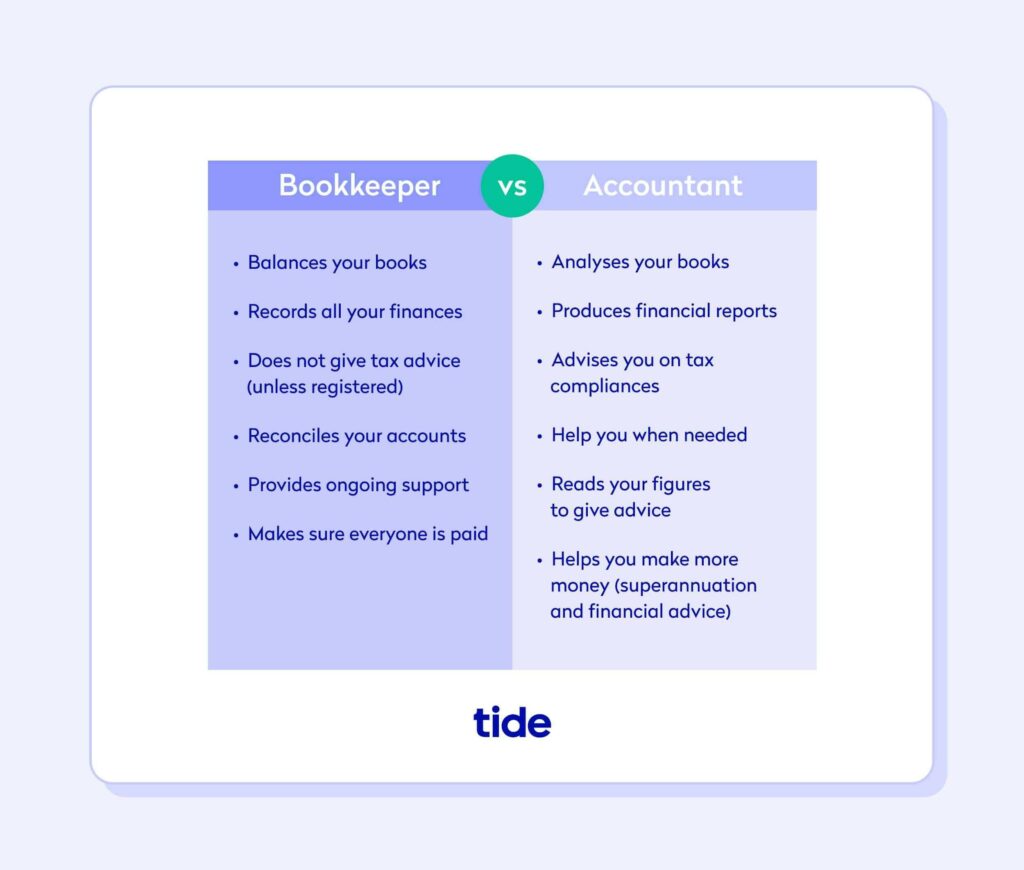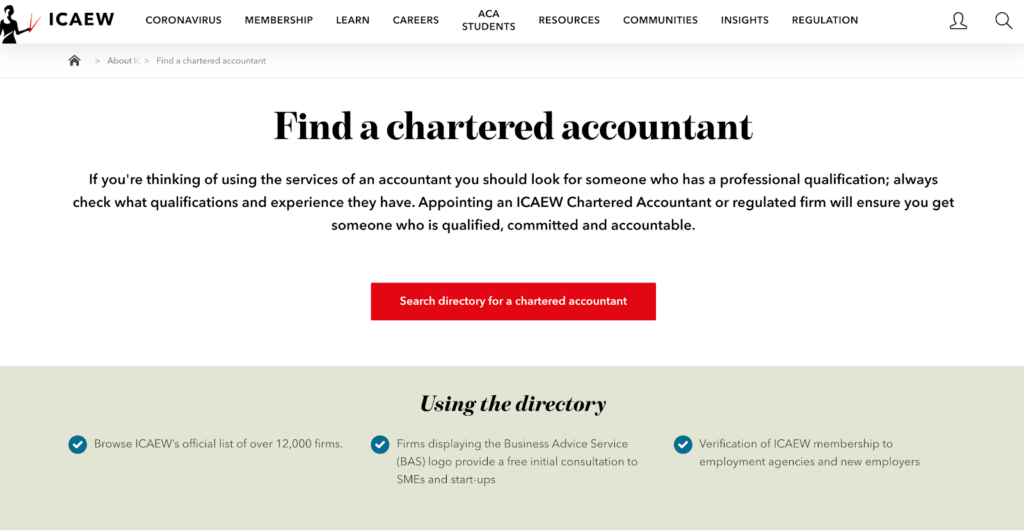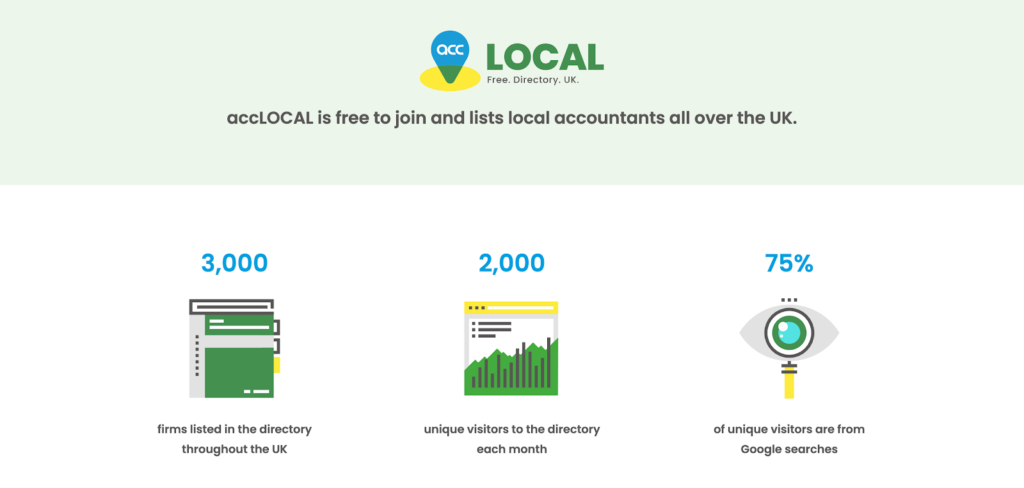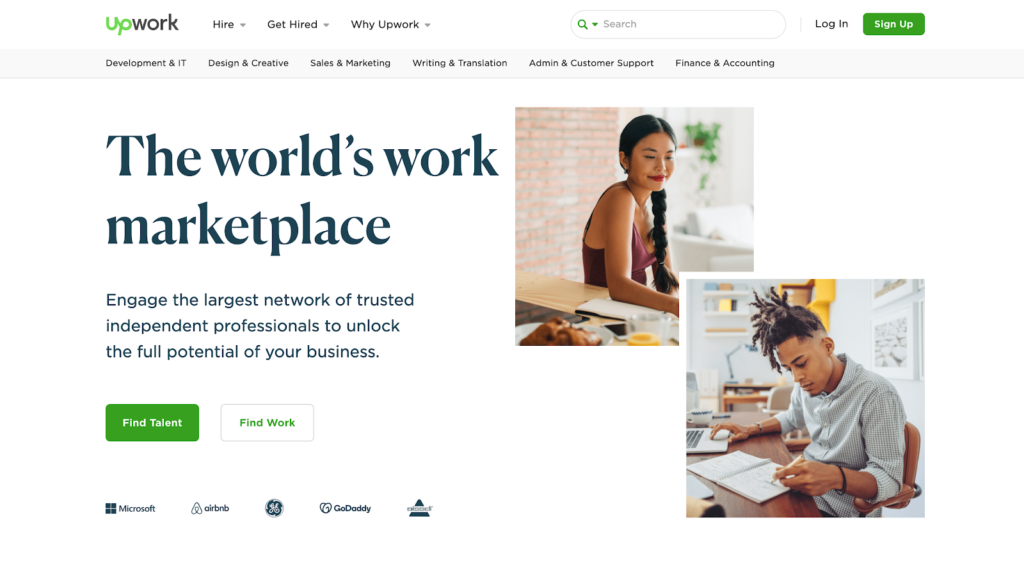
Should I get an online accountant for my small business?

When you hire an accountant, they’ll assume responsibility for all accounting-related tasks, no matter how small, repetitive, lengthy, or complex. They’ll also give you crucial advice that will help you make better financial business decisions, ensure you remain compliant with the law, file taxes correctly and on time and avoid running into cash flow problems.
Ultimately, an accountant can take the burden of financials off of your shoulders and free up your valuable time, allowing you to focus your energy on running and growing your business.
In this article, you’ll learn about the benefits of hiring an accountant, when to hire an online accountant and how to find the right one for your business.
Table of contents
- What is the role of an accountant?
- The benefits of hiring an accountant
- When to hire an online accountant
- How to find an online accountant for your business
- Expert insights
- Wrapping up
What is the role of an accountant?
Accounting is an end-to-end process that involves analysing, interpreting and reporting a company’s financial data. An accountant helps to make sense of financial records to assist in important business decision-making.
Some major responsibilities of an accountant include:
- Reconciling financial discrepancies (and preparing adjusting entries)
- Preparing financial statements and producing reports for your year-end accounts
- Recommending financial actions
- Forecasting revenues and expenses
- Analysing costs of operations
- Filing income tax and VAT returns
- Providing insight into the impact of financial decisions
We recommend hiring an accountant in the early stages of your business. Your own dedicated accountant can help you identify opportunities to cut costs and maximise revenue from day one. They also help you stay out of legal trouble by offering strategic tax advice.
Bookkeeping, on the other hand, involves recording all the financial transactions of a business on a day-to-day basis. Without effective bookkeeping, it can be difficult to analyse and understand where your business stands at any given time.

There are also several tasks that both accountants and bookkeepers traditionally do that can now be automated. These software solutions are especially useful for small business owners just getting started that aren’t quite ready or able to hire somebody to help.
For example, once you open your free business bank account, Tide Accounting software can help you categorise some of your income and expenditure to save you time and energy on your accounting.
What’s more, you’ll be able to handle your biggest bookkeeping and accounting tasks in the same account you use for your banking – with ease and simplicity.
Designed specially for busy small business owners, Tide Accounting makes it quick and easy to:
- Get paid faster by creating and sending personalised invoices
- Manage your bills better to boost your cash flow
- Track your business performance with brilliant bookkeeping
- Get your Self Assessment and VAT returns right first time
Find out how you can take the stress out of accounting with Tide Accounting.
The benefits of hiring an accountant for your small business
In the section above, we briefly discussed the role of an accountant in your business and how online accounting software can help to automate some financial activities. However, you might still be wondering whether it makes sense for you to hire an accountant, and if so, when.
To help you better gauge your needs and determine whether it’s worth getting an accountant for your business, let’s dive deeper into the benefits of hiring one.
1. Save time and money
Running a business requires you to wear many hats. As an entrepreneur, time and money are two of your most valuable assets, which is why you should be careful about where you’re investing them.
Once your business starts to grow, so will the complexity of its tasks, such as building customer relationships, managing the sales process and keeping track of financials.
This is the time to hire external help so you can focus on strategising and making important business decisions instead of juggling day-to-day tasks. They’ll also be able to recommend viable financial actions after analysing your accounting data and statements, such as where to cut costs and where to invest more money.
Hiring an accountant may temporarily increase your business costs, but can help you save thousands of pounds in the long run. This type of unlimited support from the right accountant will certainly pay for itself based on the expert advice and guidance you’ll receive.
For example, as we touched on above, there are different rules for self-assessment and corporation tax vs. what’s expected from sole traders, a limited company, or a partnership, and your accountant will know exactly how to navigate these complex scenarios. As tax laws and regulations differ depending on how your business is structured, an accountant’s insights can save your business from facing hefty fines in this regard.
2. Make better business decisions
An accountant can help you make real-time and progressive decisions for your business that are beneficial in both the short-term and the long-term.
By presenting you with industry trends, as well as the current and forecasted financial conditions of your business, an accountant can stop you from spending money in the wrong places.
For example, if you want to hire personnel for your business, an accountant can advise you on making decisions like:
- The number of staff you can afford to hire
- Whether you should prioritise hiring a manager or an executive
- Whether you should hire contractors or full-time/part-time employees
Business owners who involve senior accounting personnel in the day-to-day decision-making of their business are more likely to make effective, data-driven decisions.
Accountants can also help you make long-term business decisions, such as opting for vertical or horizontal growth strategies. These decisions often require a lot of investment and prior knowledge of industry trends and customer demands.
An accountant can quickly pull out historical data and cash flow statements and analyse trends to show you why it may or may not be a good decision to execute a strategy.
3. Create a solid business plan
If you’re looking to raise venture capital or seek investment for your business, you might want to get the help of an accountant to straighten out your business plan and financial projections.
While investors might be interested in your product, they would also want to see why it’s financially worthwhile for them to invest in you and your business and whether you’ve done all of your homework.
A good business plan contains comprehensive financial information to make it easier for investors to decide whether they want to invest in your business or not. More importantly, it focuses on specific areas that are most likely to get you the funding you need.
This is where an accountant can help you out by creating reports and offering advice on how to present all of the key financial information such as current and future funding requirements, how funds will be used and current and future financial plans and projections.
When to hire an online accountant
So far, we have established that hiring an accountant can benefit your business in various ways. The next question is whether you should hire an in-house accountant or an online accountant.
First of all, there’s no one-size-fits-all when it comes to hiring accountants. The type of accountant you hire largely depends on your business needs and priorities.
For small businesses on a tight budget, it might make more sense to hire an online accountant for various reasons.
Online accountants usually charge by the hour or a flat rate per project. This is convenient if you’re only going to use their accountancy services as needed instead of all-year-round.
However, if you’re looking for an accountant to help you with making day-to-day business decisions, it may make more sense to hire a full-time, in-house employee.
Since in-house accountants will be working closely with you and other colleagues on a daily basis, they’ll have a better understanding of your work culture and business needs.
Full-time, dedicated accountants might even be open to handling some other tasks if needed, such as minor bookkeeping and solving HR-related issues.
While hiring an in-house accountant can be beneficial if you value face-to-face interaction, it may cost you more than hiring an online accountant. That’s because an in-house accountant will most likely work full time and thus be classified as an employee, so you’ll have to factor in the costs of their salaries, benefits, accountancy software subscriptions and office expenses.
That said online accountants who work remotely can certainly be hired as full-time remote employees, too. In a remote world, face-to-face meetings can still be conducted with video conferencing software, and communication can be carried out asynchronously or in real-time with collaboration tools like Slack, or simply via email or messaging platforms.
Traditionally, accountants needed to come to the office to work with paper reports and filings, but with the advent of online software that’s no longer always the case. Modern technology has made it possible to do many accounting tasks online, and integrations have made it easier than ever for your accountant to automatically get your financial information directly from your bank accounts without relying on manual uploads from you.
Chris Mollan, Founder and MD at Clever Accounts and a proud Tide member, notes that online accountants aren’t all that different from traditional accountants.
“Online accountants are growing in popularity, and offer almost all of the same services as a traditional accountant. Just like an accountant on the high street, online accountants will take the time to speak with you, get to know your business and learn how they can support your business needs.”
Another reason you may want to hire an online accountant is if you’re looking for someone with very specific skills or expertise. When hiring online, you have a lot more options to choose from, and as you’re also saving on your overhead costs, you can afford to hire highly skilled professionals to help you with specific accounting tasks.
In this regard, Chris also notes that “online accountants work to streamline the services that they offer and respond to queries as quickly as possible, whilst ensuring that they are a cost-effective solution for their clients.”
How to find an online accountant for your small business
If you’ve decided you do want online accountancy services, the next step is to find a reliable candidate who fits your requirements and business needs.
Here are five steps to finding an online accountant for your small business.
Step 1: Use your connections
When you begin your search for the perfect online accountant, it’s a good idea to first look within your own personal and professional network.
People who already know who you are, what your business is and what you may need are more likely to recommend online accountants who are a good fit. This helps save you valuable time in searching for the right candidates and then shortlisting the best ones.
Plus, a strong reference by someone you know and trust can minimise the risk involved in hiring an accountant over the internet.
However, you should never blindly accept recommendations, even from people you personally know and trust. Make sure you analyse if an accountant can actually help your business by evaluating the type of work they previously did and the results they achieved.
For example, if an online accountant worked well for your friend’s digital marketing agency, it’s not necessarily true that they’ll match the requirements of your manufacturing business. Similarly, an accountant who has only worked with companies with less than 10 employees at a startup-up might not be the best fit for an established enterprise company with over 50 employees. Why? Because as an organisation grows, its needs become more complex and your accountant should be familiar and comfortable with handling them.
Step 2: Search on the right platforms
A quick search for online accountants on Google might not be the best way to look for the perfect candidate. Here’s why.
When you search for accountants on Google, you’ll be bombarded by local search ads, which can skew your judgement and make it difficult to make an informed decision.
Plus, you’ll be presented with hundreds of different options, which can be a hassle to sort through. This is where specialised platforms can come in handy.
There are several platforms and online accounting services that help clients connect with professional and local accountants. Most of these accountants also offer online and cloud accounting services.
1. Institute of Chartered Accountants in England and Wales (ICAEW)

ICAEW is part of a professional membership organisation that promotes and supports chartered accountants all over the world.
Members of the portal start out by completing formal training and registering themselves as students. However, fully qualified ACCA members with at least five years of full membership can join the platform based on their experience.
ICAEW services a number of high-profile clients, which is why they have tough membership criteria.
If you’re looking for ICAEW chartered accountants, ICAEW-licensed individuals, or ICAEW licensed/accredited firms, fill in this form with the type of service and location you’re looking for to browse options.
2. AccLOCAL

AccLOCAL UK is a rich directory of local qualified accountants and accountancy firms that can help your business with various financial tasks.
From auditing, bookkeeping and running payroll to filing income tax returns, IR35 and retirement planning—you can find a professional for every task.
Simply type in your postcode and choose the maximum distance that works for you. Browse through the available options and get in touch with accountants through their websites, phone numbers and email addresses.
3. Upwork

Another great platform for finding online accountants is a freelance marketplace like Upwork.
Upwork lets you access a global pool of talent, which means competitive rates and hundreds of options to choose from.
You can either browse profiles of freelance accountants and send them invitations, or post a job with a set budget and wait for applicants to send in their proposals.
Step 3: Shortlist the best candidates
Regardless of where you decide to search for an online accountant, there’s a high chance you’ll end up with more than one candidate to choose from.
To simplify your decision-making process, you can screen all potential candidates and shortlist the best ones before you start interviewing them.
On platforms like Upwork, it’s easy to narrow down your search by applying filters for star rating, hourly rate, number of hours worked and more.
You can also read reviews and testimonials of their past clients to shortlist candidates you feel would be the best fit for your business and the online service you’re in need of.
Shortlisting the best candidates can help save you from spending hours interviewing candidates who were never the right fit in the first place, only to disqualify them because they charge too much or can’t provide the service you’re looking for.
Step 4: Ask the right questions
Once you’ve shortlisted the best candidates, it’s time to conduct in-depth interviews that will allow you to gauge the value an accountant will be able to bring to the table.
While there are no hard and fast rules to what you can ask a candidate during an interview, it’s always good to have some guidelines that can drive an interview in the right direction.
Here are a few questions you should ask an online accountant before you decide to hire them.
Can you tell us more about your experience and skills?
While you may have already read about the accountant’s experience and skills on their profile or website, this is where you can verify that information by asking them to go in-depth.
Asking for a more detailed account of experiences and skills can also help you better understand a candidate’s expertise, the type of projects they’ve worked on in the past, the results they achieved and if they possess any other qualities that can give them an edge over other candidates.
This question also helps you to gauge whether an accountant is good at communication, which can be a critically helpful skill to have when working with someone over the internet.
Are you familiar with the latest laws and regulations?
In the accounting and business world, it’s important to always stay up-to-date with the changing policies, laws and regulations introduced by the government.
Ask your shortlisted candidates about best practices relevant to the current legal landscape. If they’re aware of the latest HMRC policies and rules, it’s a good indication that they know what they’re doing and will be able to prevent your business from getting into legal trouble.
What are your payment terms?
While you may already have an idea of how much an accountant charges for their services, it’s always a good idea to discuss expectations and your budget so you’re both on the same page.
Other than the rates, you can also discuss the payment methods, frequency and whether an accountant would be willing to switch to a monthly fee or flat-rate from an hourly rate, or vice versa.
Other important points to discuss are the payment expectations if a project goes beyond the specified scope in the case that there are any urgent tasks at hand.
What does your work process look like?
Hiring an online accountant means you won’t be physically present to monitor their working hours or specify processes and the type of software to use.
Asking this question allows you to get a better idea of how an accountant works, what documents or access they require from you, the tools they use and what deliverables they would send over, among other things.
It’s also helpful if an online accountant works the same hours as you, as it means you can solve issues as they arise rather than losing a day waiting for a response that may need an immediate answer.
How do you handle issues and challenges?
It’s good practice to inquire about any challenging situations an accountant might have navigated through in the past.
This can help you gauge how a candidate will respond to different kinds of issues and situations if they arise in your business and determine whether that’s the kind of person you’d want to work with.
Step 5: Run background checks
Once you’ve finished interviewing shortlisted candidates, you’d likely want to seal the deal and hire the best one right away.
However, it’s a good idea to double-check the credibility of a candidate, such as by looking for reviews online or directly asking for references.
Make sure you personally contact each reference and verify the information the candidate has shared with you about their past projects, experiences and skills.
If everything looks good, you can safely hire an online accountant and start working with them.
💡 Expert insights
Darren Fell is the CEO and Founder of Crunch, an award-winning online accounting service that supports freelancers, contractors, and practically anyone who’s self-employed.
For over ten years, Crunch has combined easy-to-use, online accounting software with actual human beings, so that you’re always able to access your accounts and seek the support you need.
Crunch helps thousands of clients with their accounting needs every single year, using their years of expertise and insight to help small business owners manage their responsibilities.
Q1: When is the best time for a small business owner to hire an accountant (and why?)
The best answer is straight away! A good accountant can make sure your business is set up in the most tax-efficient way possible, and help you claim all of your allowable business expenses to reduce your tax bill. They’ll also get you registered for all the right taxes, help you understand whether your business should be VAT registered, and remind you of all of your deadlines for filing information with the government.
Getting the right advice is key to avoiding any nasty shocks or unexpected tax bills, especially if you’re new to the world of self-employment. Having someone in your corner that understands all of the various tax rates, due dates, and the responsibilities that come with running a limited company is invaluable.
Beyond the peace of mind of having an expert on hand, a good accountant can take the pressure off, too, and allow you to focus on what you love, and what you do best!
Q2: What should business owners look for in an accountant when evaluating their options?
Trust: trust is perhaps the most important quality in an accountant (alongside their expertise, of course!). After all, this is the person who’s going to be responsible for helping you tackle some of the most important responsibilities you have as a small business owner.
The quality of an accountant is of course measured by their know-how and understanding of tax responsibilities, but every qualified accountant worth their salt should be highly educated in these areas. The relationship you’ll establish with your accountant is based on trust, so ask yourself: is this accountant reliable? Do they have my businesses best interests at heart? Do they specialise in small businesses and self-employed business owners? Do they keep up with the latest changes to tax rules or business support? Are they easy to get hold of, or do you need to book specific appointments?
Of course, you also have to understand what fees they charge for what services, and if they’re the type of accountant to nickel and dime you for every piece of advice they offer, or that demand a fee every time you need to talk to them, they’re not worth your time. We’d say that a fixed-price monthly payment that includes unlimited support and advice whenever you need it, as well as easy-to-use online accounting software to save you time and let you focus on your business, is the best way to go!
Wrapping up
Hiring an online accountant can help you grow your small business by handing over all kinds of financial tasks to a specialised professional. This leaves you with plenty of time to focus on more important tasks.
Make sure you look for online accountants in the right places and do your due diligence so that you choose the right accountant for your own business.
Photo by Mimi Thian, published on Unsplash






